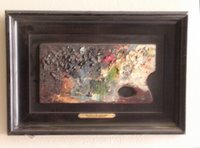Emotional Content
"I have also been very impressed by Mary Qian. She has a lot of talent and a lot of personality. That's a weird painting, but I love it. Let's hope Mary can avoid the pull of the market down. What may allow her to do that is the new mixed gallery, which Ann Nathan in Chicago is just one example of. Nathan is not what one would call a realist gallery, by the old delineations, and Qian is about the most traditional artist there. Nathan has no problem with weird, and would appear to require it. But this means that Qian is straddling the old markets, showing at both Nathan and Legacy, for instance. I don't think Legacy would show this work, and neither would Saks or Greenhouse. This seems to be confusing for Qian, who is experimenting with a lot of styles and subjects. Nothing wrong with that, though, as long as she keeps producing good work."
Painter, and internet curmudgeon, Miles Mathis, has recently singled out Mary Qian for admiration in one of his periodic rants about the emotional content of contemporary realist painting.
Also mentioned, though not as positively, are several other artists/teachers associated with the P&C : Richard Schmid, David Leffel, Sherrie McGraw, Greg Kreutz.
"I remember hearing a speech by Richard Schmid, an influential realist, who stated this pretty much in those words. For him, art seemed to be a technical matter and little more. Although his paintings did not lack all content (at least back in the 80's), his teachings stressed the technical and abstract side of painting to such an extent that almost all students misunderstood him. The students became so obsessed with “edges” they forgot that a painting also required a subject, and not only a subject but an object. Meaning, there had to be a reason to paint the thing beyond your desire to refine edges.
As I recall, Schmid has also advised students to "paint what you love", but who can write a "how to paint" book without prioritizing technique?
Can I really feel such horror in a realist gallery? I can and do. It is now a revulsion beyond any argument about taste. There are many things in this world I don't care for but can abide. Art has now gone far beyond that. It fills me with a dread: not an existential dread like Sartre felt when he picked up the rock at the beach (see the book Nausea), but a real and immediate dread, like the dread a cat would feel in a room of a million mice. Or, more precisely, the sort of dread you would feel in a room with a million robots. These androids have faces like yours, but they do not see the world as you do: are they really your brothers, or will they malfunction the next moment and tear you limb from limb?
Some have tried to sell realism as a humanizing force in contemporary art, or as a counterbalance to the brutalities of modernism and postmodernism, but even where realism has avoided being absorbed directly into the postmodern agenda (as Currin or Saville or Nerdrum has been absorbed, for example), it has not avoided being being de-spiritualized and corporatized with the rest. An art drained of all content cannot be a humanizing, and so realism has become little more than an alternate dehumanizing. Conceptual art and realism have become two paths to the same end.
Do you agree with him?
I share his preference for Jeremy Lipking over Nerdrum, Currin, and all of the other figure painters that he mentioned, while I don't think that contemporary landscape painting is as emotionally barren as he suggests.
Mostly I'm just glad that someone looks at so much contemporary realism and then writes passionately and succinctly about it.
Ever since American academia bought into Clement Greenberg's distinction between art and life (i.e. avant garde and kitsch) most of those who love paintings of people and the world around them have been burdened with an intellectual inferiority complex that keeps them silent and clannish, just as the members of the Palette and Chisel have little interest in having their gallery display any work other than their own.



0 Comments:
Post a Comment
<< Home